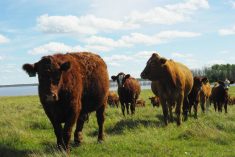British Columbia farms and ranches will have mandatory premises identification when the province implements a regulation under the B.C. Animal Health Act, which is expected in early 2022.
Premises identification is designed to better equip livestock producers and rural communities for emergencies and help responders locate sites. It can also be useful in managing outbreaks of animal disease.
Lana Popham, B.C. minister of agriculture, food and fisheries, said the plan to implement premises identification was done after consultation with the farm and ranch sector.
Read Also

Farming Smarter receives financial boost from Alberta government for potato research
Farming Smarter near Lethbridge got a boost to its research equipment, thanks to the Alberta government’s increase in funding for research associations.
“B.C. farmers and ranchers have been clear that a new regulation to trace their animals is needed, and we are listening,” Popham said in a Feb. 5 news release.
“Rapid access to information is key in an emergency, and premises ID was invaluable during the 2017 wildfires. When the new regulation is in place, it will include mandatory registration so we can effectively support industry in responding to both animal health and environmental emergencies affecting livestock and poultry.”
There will be no cost to register and the ministry has said it will remain free. Registration can be done on-line, or through paper registration.
Under the mandatory program, people will be required to register all sites where animals are raised, kept, assembled or disposed of, either temporarily or permanently.
The government said it received about 850 comments to an intentions paper about the proposal and it invited input for a six-week period from Aug. 30 to Oct. 14, 2019. Responses came from livestock producers, local governments and industry associations.
Kevin Boon, general manager of the B.C. Cattlemen’s Association, said the move is useful for both traceability and emergency planning.
“The value of having premises I.D. was proven for emergency management in the 2017 and 2018 wildfires with the biggest hurdle, at the time, being that producers were not yet signed up. We never know when these events will occur, but having the security of knowing that you are registered if it does just makes sense.”
B.C. has a voluntary registration system in place and an estimated 64 percent of livestock producers, some 5,100 premises, are registered. According to provincial data, 100 percent of dairy, swine and poultry operations are registered under the voluntary system.
This year is the last in which participation in premises identification will be voluntary.
“During the record-setting wildfire season of 2017, the premises I.D. program was used to help at least 189 ranchers access their animals in evacuation zones, saving the lives of hundreds of animals,” the province said.
Alberta imposed a mandatory premises identification regulation in 2009 under its Animal Health Act. Saskatchewan also has a mandatory program under which at least one premises identification number is needed for those who own livestock, poultry or other animals. Manitoba also requires premises identification for livestock owners regardless of type. Its list runs the gamut from usual livestock through to farmed bees, exotic show hens, aquaculture and captive wildlife.
Contact barb.glen@producer.com


















